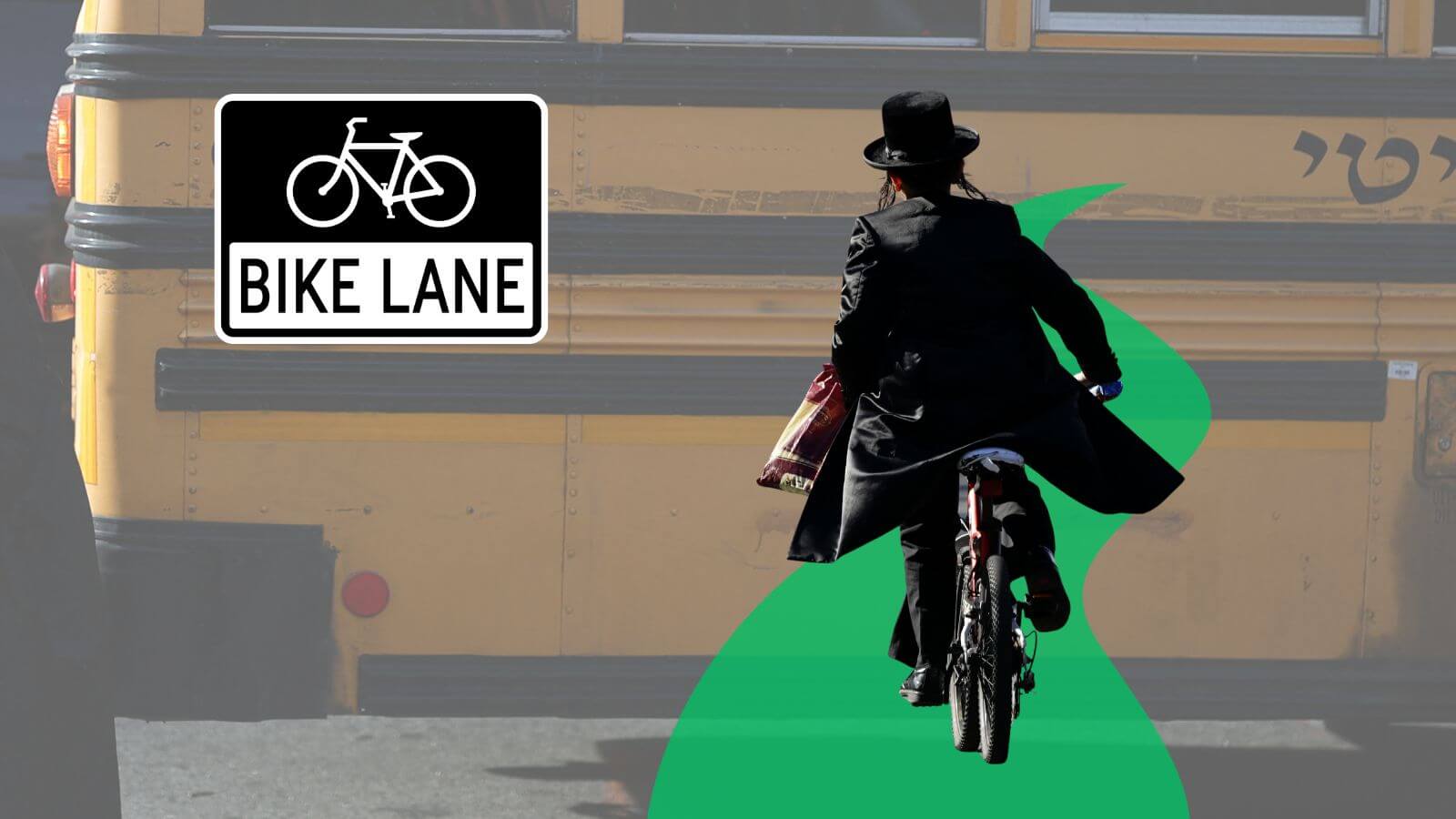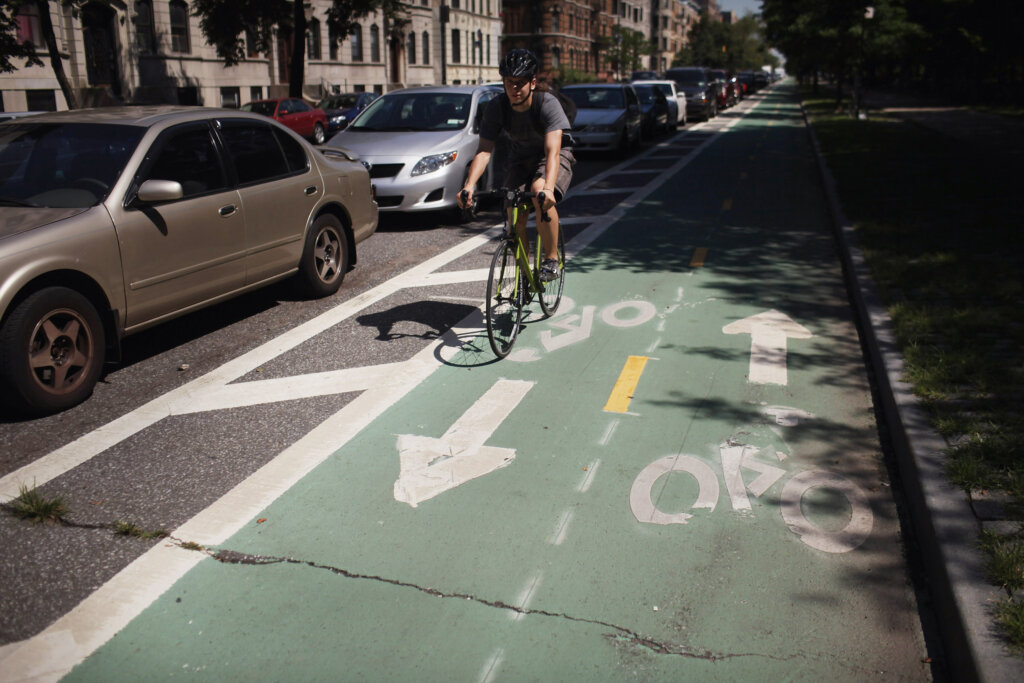It’s Jew vs. Jew in the fight over a Brooklyn bike lane
Hasidic Jews have long wanted to get rid of the bike lane; a Jewish family sued to protect them

The fight over the bike lanes in Hasidic Williamsburg has been going on, more or less, for over a decade. Graphic by Mira Fox/Getty Images/Canva
Ever since Williamsburg began to gentrify, there’s been a cultural clash between, as many a headline has put it, hipsters and Hasids. And at the heart of it, since 2010, has been a bike lane.
Anyone who bikes in Brooklyn has taken the bike lane on Bedford Avenue somewhere; it runs across the entire borough, all the way from Sheepshead Bay to Williamsburg. Or, almost to Williamsburg: The Satmar Hasidim who live there complained after it was built; some said that women who biked by were too scantily clad, others that the bikes were dangerous. Maybe it was just that the lane made it easier for the artisten — you can figure out what that’s Yiddish for — to move in. In any case, today, the bike lane ends abruptly at Flushing Avenue, and even though the cyclists themselves often continue to bike down Bedford despite the lack of lane, the hubbub died out.
But the conflict is back. Only this time it’s not Hasid vs. hipster — it’s Hasid vs. Hasid.
Well, not really; Baruch Herzfeld declined to label his Jewish identity when we spoke by phone. He sends his son, Rafe, to an “open Orthodox” Jewish day school and said he has friends who are Satmar, friends who are Lubavitchers, and thinks all the identity labels are inaccurate.
What Herzfeld is happy to discuss, however, is the bike lane. He’s been involved in the fight to protect it since the very beginning, when he ran a nonprofit bike shop in Williamsburg called the Traif Bike Gesheft, or “unclean bike business” in Yiddish, and even ran a vending machine for bike repair parts.
“It’s like Monet, you know? Monet always painted the water lilies,” he told me of his advocacy around biking. “This is my water lilies.”
Now his son, who is newly 13 and a bar mitzvah, has joined the fight, speaking at town halls and giving quotes to reporters, even repeating a story I heard from his dad: that the bike lane opposition from the Hasidic quarter all stems from an 1895 incident in which a boy’s tzitzit, or religious fringed shirt, got caught in the bike wheels, and the Satmar rabbi banned bikes as a result. (I can’t find any other reference to this alleged incident but that doesn’t mean it didn’t happen.)

The problem is this: Part of the bike lane on Bedford was upgraded in late 2024 into a protected bike lane, meaning that a row of parked cars separates the bikes from the traffic. They also protect the bike lane from what I personally consider the worst scourge of biking in Brooklyn: double-parked cars, which were a constant obstacle on this stretch of the street.
Illegal but almost never ticketed, these cars block the bike lane, forcing cyclists to swerve out into traffic, dodge open car doors and squeeze between the parked cars and the ones in the roadway. After the protected lane was installed, injuries dropped a whopping 47%, according to the New York Department of Transportation.
But the Williamsburg Hasidim complained the protected bike lane was dangerous, particularly after a video of a 3-year-old girl being hit by an e-bike spread throughout the community. Their argument was that requiring children to pass through the row of parked cars when being dropped off by school buses meant the cyclists couldn’t see them coming.
Herzfelt was skeptical that this was the real reason; protected bike lanes exist all over the city without issue. “The day the bike lane went in they were against it,” he said. “They waited for some video footage and then they went to the government.”
The city at first attempted to create school bus drop-off zones to solve the issue. But this didn’t work; just as they ignored the paint outlining the bike lanes, cars ignored the school bus areas, and parked in them. Besides, city lawyers argued, it “was not the custom of school bus operators” to use the designated zones anyway, so the problem remained.
So current New York City Mayor Eric Adams ordered that the protected bike lane be downgraded to an unprotected lane again. Many people saw this as a naked bid for the Hasidic vote in the upcoming mayoral election, in which Adams is running as an independent; after all, in the previous era of bike lane fights, then-mayor Bloomberg won the Hasidic bloc after removing the Williamsburg stretch of the Bedford bike lane.
In response, Baruch Herzfeld and Rafe, who uses the lane to bike to his after-school activities, filed a suit against the city alongside bike advocacy group Transportation Alternatives.
The lawsuit alleges that the change to the bike lane amounted to a “major transportation project,” which, according to city law, requires a lengthy approval process, involving all kinds of speedbumps like community meetings where residents could approve the plans. Adams had done none of that, they said, meaning the change was illegal.
But this wasn’t the only reason the Herzfeld family filed suit. In posts and articles about the battle over the bike lane, many commenters are hasty to smear Orthodox Jews. “I hate when any group thinks they should have special rules,” reads one comment on an Instagram video about the issue. “That bike lane was promised to them 3,000 years ago” sneers another, including the eye-roll emoji.
“I wanted to make sure it wasn’t a ‘you versus them’ issue,” the elder Herzfeld told me about the lawsuit. “I didn’t want politicians to believe that Jews don’t bike or are a monolith of opinion. And to make sure that, when people bring this up, it’s not that Jews are bad.”
The case went back and forth in the courts, with the Herzfelds appealing several times, often preventing the city from tearing up the bike lane just hours before construction was due to begin. Rafe spoke at a town hall where he was booed by the Hasidic neighbors he opposed, who, Rafe wrote in a blog about the experience, told him that he “ruined the meeting by wearing a yarmulke and supporting the bike lane.” They ended up talking about the Talmud and discussing Rafe’s upcoming bar mitzvah.
Eventually, however, a few weeks ago, the Herzfelds lost, with judges ruling that the lane was merely a traffic “modification,” not a major transportation project, and thus didn’t need to go through a lengthy approval process. This week, the newly unprotected bike lane was back, and as full of double-parked cars as ever.
But Baruch Herzfeld told me he wasn’t too worried about it. “We’re just glad that we stood up so that people don’t think that it’s a Jewish versus non-Jewish thing,” he said.
Moreover, Herzfeld actually considered the decision a win, even though his case was dismissed. By allowing Adams to change the bike line without jumping through all of the hoops involved in most other transportation projects, the case may set a helpful precedent.
“So the mayor decided that he’s able to move a bike lane from a class 1 bikeway to a class 2 bikeway. Then — do you study Talmud? — so you know that, why not turn a class 2 bikeway into a class 1,” he told me. “The Herzfelds are hopeful that if there’s a new mayor — if for some reason the mayor who is polling at 12% doesn’t win — that a new mayor will be able to restore the bike lane.”

















